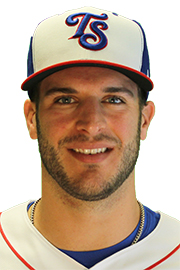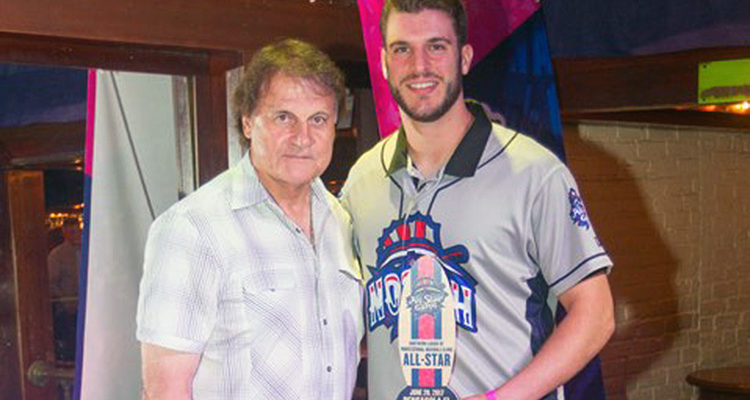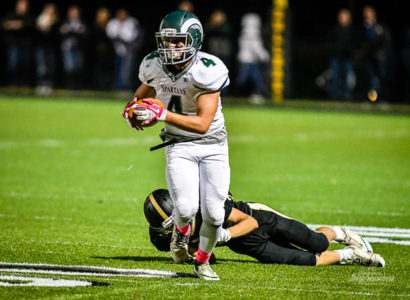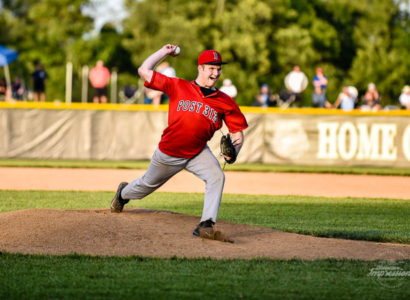James Pugliese with Tony La Russa, former manager of the Chicago White Sox, Oakland Athletics, and St. Louis Cardinals. Submitted Photo.
Steinert grad and Cubs’ Farmhand James Pugliese talks about his strong season as free agency approaches
By Rich Fisher
Fish4scores.com
June 27: Now in his first full year of Double A baseball, 2010 Steinert High graduate and Mercer County Community College product James Pugliese is in his seventh season with the Chicago Cubs organization. Still just 24-years-old, Pugliese is pitching with the Tennessee Smokies of the Southern League and was named to the North Division All-Star team (the game was rained out last week).
In 2015 and ’16 Pugliese played partial seasons with Tennessee and played most of the year in the Class Advanced A Carolina League. He has been with the Smokies, who are in the Knoxville suburb of Kodak, Tennessee, for the entire 2017 season. In five starts and 16 relief appearances, Pugliese is 4-2 with an 0.84 ERA, one save, 32 strikeouts and 17 walks in 42.2 innings. Hitters are batting .178 against him and he has a 1.01 WHIP.

James Pugliese
“Pugs” feels this is his best season to date and noted that he will become a free agent at the end of this season. He took timeout on Monday to chat with Fish4scores from his hotel in Mobile Alabama, where the Smokies were preparing to complete a series with the Mobile Bay Bears. James discussed pitching in Major League camp, his situation with the Cubs, his latest pitching repertoire and several other things.
RF: So, where the heck are you in Tennessee? Up in the mountains?
JP: Actually, it’s pretty close to it. The area around the field you can see mountains and stuff. It’s pretty cool.
RF: When did they decide to bring you up to Double A fulltime?
JP: This year. I was in spring training. I was invited in to Major League back-up camp. Since the Cubs went to the World Series, they have guys go in just to fill in spots for the big league games at spring training. I had six appearances there. After that, I broke with the Smokies after spring training, on April 2nd.
RF: So, you pitched in some actual MLB spring training games?
JP: Yeah, it went good except for one. I had one bad one. Other than that, it was pretty good. I got called two weeks before spring training saying, “We’ve got a spot open for this Major League back-up camp, do you want to come to it?” I said yeah, that would be a great opportunity to do that. So I was with the Major League Cubs. Being in the same bullpen and the same dugout with all those guys, it was fun.
RF: Did you pitch against any names we might know?
JP: The (former) Phillies catcher, Eric Kratz, I faced him (see video). I almost pitched against Joey Viotto, he was one batter before I came in, but I didn’t get to face him.
RF: What kind of education did you take out of that?
JP: Yeah. They didn’t really say much. This guy Wade Davis, he’s doing really good right now in the Cubs bullpen. We were on a plane to Houston and I was sitting next to him and he just talked my ear off about the grind in the minor leagues. He did it for about the same amount of time as me. Even more. He did it for eight years, 10 years in the minors. He finally made it and he stuck in the major leagues. It shows that the guys who do play a long time in the minors, there are places for them if they put the work in and put up their numbers.
RF: Did that make you feel good, like there’s still a chance?
JP: Yeah, exactly. It definitely did. No matter what, I still would stick with it, regardless of what people would say. I’m still here, I’m still playing. This is actually my last year with the Cubs, I’m a free agent after the season. I lasted the full first-year player contract. So that’s pretty good.
RF: What does that mean?
JP: So at the end of the season, after the World Series I’m a free agent. From there I have an agent, who will get contacted by all 30 teams that will ask “What’s he looking for in price, how much per month?”, all that kind of stuff. I’m not sure how it completely works yet. I’m still learning because this is my first time. I’m talking people who are free agents. They’re giving me some info that I need. But there’s still a lot to learn and a lot of time to put in before that. So I just gotta keep putting up numbers so I can get picked up.
RF: Some people might say that after seven years it’s not happening. How would you assess where you are at right now?
JP: I’d say I’m pretty successful at being pretty versatile as a pitcher. Last year I started for half the season when somebody got hurt. So, I’ve really improved on pretty much all aspects of pitching. If you’re in Double A, usually the guy has just one job. Either a reliever or a starter. Being able to do both, actually all three, being able to close games too, I think it just adds to maturity and experience and just getting ready for that one day when you make it to the major leagues.
RF: And you’re still only 24. It’s not like you’re some 29-year-old just hanging in there. Are you still feeling pretty good about your progress?
JP: Absolutely. Having a good year in Double A and being on the mid-season all-star team really does help my stock after the year when it comes to signing a free-agent contract. They’re not gonna just want somebody who posted like a 5 or 6 ERA in Double A. Your chances of getting picked up are very slim there. If I want to keep playing, I want to be able to do well so I can have another opportunity to play, either with this organization, which would be cool, or another. Whichever works I just really want to pitch.
RF: You can always come to my team (the Phillies). Worst record in baseball. We need help.
JP: (Laughing) Yeah, I see it’s not looking too good.
RF: What’s your role this year?
JP: I have five starts and they actually added me to the starting rotation this year but we just had a Major League rehab guy (Brett Anderson) come in and pitch (Sunday) and started when I was supposed to start. Obviously, the Major League rehab guys have priority, he took my spot and I just piggy backed in after him. He goes his four and then I’ll go three.
RF: What are they grooming you as?
JP: Seems like I’m gonna be the guy that does everything since I’m able to throw four pitches for a strike. That’s very needed as a starter. They only require three as a starter in Double A but if you’re able to throw strikes and pound the zone and get early contact, you fit that starter personae. The reason why I’m not a starter, this is my seventh year, this front office didn’t even draft me, they don’t have much invested in me, I’m not on their prospect list or anything. that’s just how the business side of it works. Until you understand it you’ll ask yourself a million questions about why you don’t have that spot. But once you understand it, all you have to do, is do what they say and do your job and you’ll stick around.
(Thomas) Ricketts was still the owner when they took me. (General Manager) Theo Epstein came in in 2013, so the whole front office has been reorganized and all that kind of stuff since I’ve been drafted. They kind of just took me under their wing and did what they needed to do with me. I’m just happy they kept me around so I’m able to still pitch. There have been a lot of worthy guys who put up numbers, who were released instead of me, which is kind of crazy to think about. That’s just the game, that’s just how it is.
RF: What are the four pitches you have now?
JP: I added a cutter/slider this year, I have two-seam, four-seam (fastball), a change-up, which is my best off-speed, and a curveball.
RF: Did it take long to learn the cutter/slider?
JP: Actually, no, I learned it one day before I came to Double A and I’ve been pretty quick with learning new stuff and making adjustments. If they tell me something I know that I will improve on, it’s weird, I learn it in a second. It’s something I’ve been blessed with. I don’t know, it’s pretty crazy how it works, it’s hard to explain. It’s really helped me with these numbers. Each year I learn something new that helps my season.
Having that cutter, something that breaks away to a righty, was something I needed because my two- seamed change-up would go inside to a righty and I need something that goes away.
RF: Who’s the pitching coach?
JP: Terry Clark. He’s an awesome guy. He even said it himself, that “I’m gonna treat you guys like my children.” He really does take care of us. Mark Johnson is our manager, and I’ve always said he’s my favorite manager. He really stuck up for me to get me into the (2017) All-Star game. He always does what he feels is right. He was a player at one time.
RF: How much better is Double A than Rookie League? Do you feel you’re at a higher level?
JP: Yeah definitely. The umpire’s zones are way smaller and the hitters have a better approach. They’re not just going up there swinging. You’ve gotta be able to throw your pitches for strikes. If you’re just throwing fastballs over the plate, no matter how hard it is, it’s gonna be hit. If they catch on to that and see you’re not throwing off-speed for a strike, they’re sitting on it. So it’s pretty much black and white with the improvements on everything. It is a lot more difficult.
They always say it’s the hardest level, and that from High A to double A it is the hardest adjustment to make because of the smaller zone, and because he players at this level are always the prospects for the teams.
RF: Have you noticed this has been your toughest jump?
JP: Honestly, I think I pitch better when they have a better approach, because they’re not just swinging at my first-pitch fastball. They’re waiting on pitches. And with me, if you wait too long I’m gonna get you out by location. I’m not gonna overpower people anymore, I’m 88 to 92 (MPH fastball), pretty low. But I’m able to throw the ball down and throw it where I need to. And being able to pitch inside helps. Not only to just pitch inside but to get them off the plate. Pitch inside so he opens up the outside and the outer half of the plate. It’s just all this stuff that I’ve learned over the years. This is actually the best season I’ve ever had in my life. I think learning all that kind of stuff has really helped out.
RF: Yeah, it seems whether you’re done playing in a year or 20 years you’ve gained enough knowledge to step in and be a coach with the knowledge you’ve gained.
JP: Yeah, pitching coach for sure. I’m not sure about manager. I could learn about being a manager eventually. But definitely a pitching coach. I’ve done pitching instruction in the off-season for the last six years for Ryan Pandolfini. And (Nottingham assistant) Rob Nosari just contacted me about winter lessons with the Princeton Little League. It depends on how much time I want to spend on it because I already miss six months with my family. I’ve also done lessons the last five years with Nottingham Little League. Bob Montague runs it and my dad (Mark) goes out and helps me.
RF: What was it like for you guys in the minors with the Cubs winning the World Series? Any impact? Is it like a pride thing?
JP: Not really much happened with the minor leagues. We were there saying congratulations to everybody in spring training. Other than that, we’re still going about our business, there’s nothing changed about anybody that I noticed. But it is kind of cool. I played with some players who got rings. I actually put one on and it was pretty sick.
RF: And finally, what are your thoughts on fellow Steinert and Mercer product Anthony Peroni getting drafted by the Nationals?
JP: Always worked hard. I’ve known him for three years now, just seeing him at Mercer and GTP (Game Time Performance). He always worked hard, I could tell. I always heard about him from Steinert. It’s awesome to see another kid’s dream come true from Steinert. It just shows it can happen to anybody if you put your work in. It’s not always what you do with practice it’s what you do with your own time and how you spend your own time when you’re not at practice.
I think he’s put in the work. He’s always there earlier than practice started, hitting the cages and stuff like that. He’d come in early and catch our bullpen when we needed him; all the pro guys (from the area) in the off-season. You could see he wanted it.










